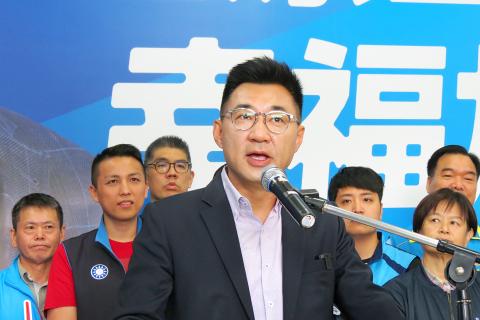Chinese Nationalist Party (KMT) Legislator Johnny Chiang (江啟臣) yesterday became the fourth entry to the party’s chairperson by-election.
The KMT had made a bad decision and wasted the public’s trust, which led the party from victory to defeat in the space of just a year, Chiang told a Lunar New Year tea party at his Taichung office.
If the KMT again allows calls for reforms to be just slogans, it could suffer more defeat and become history, he said.

Photo: Su Chin-feng, Taipei Times
He and the KMT have a responsibility to the nation, Chiang said, adding that the party must work fast to regain the public’s trust and continue to supervise the government, thereby bringing about a better Republic of China (ROC).
If elected, he would push reforms based on the KMT’s core values: democracy, justice and innovation, the lawmaker said.
He would ensure that older KMT members pass the torch, and he would include the planned KMT reform committee — which is to be made up of the party’s 15 mayors and county commissioners — as well as members of the KMT caucus to the party’s management, which should be a coordinator and a guide for the caucus as well as the local governments run by the KMT, not just be a commander, he said.
Chiang promised to focus on consolidating the party’s support in the central and southern parts of the nation, where campaigning has been the most difficult, adding that it would demonstrate the party’s sincerity and resolve to voters.
He would take the KMT to the streets to meet grassroot members to learn about the issues they care about, Chiang said, adding that only through this can the party forge a bond with the masses.
Asked whether the KMT’s cross-strait stance had been factor in its election defeat, Chiang said it had been one of the causes and the party needs to be open to all kinds of opinions on the issue.
“To the KMT, any discussion on its cross-strait stance must be based on acknowledgement of the fact that the ROC exists. No matter what stance the other side of the Strait takes, it must direct its attention back to the fact that the ROC exists,” he said.
KMT Legislator Lin Wei-chou (林為洲), KMT Central Committee member Sean Lien (連勝文) and former Taichung mayor Jason Hu (胡志強) attended the party.

US President Donald Trump yesterday announced sweeping "reciprocal tariffs" on US trading partners, including a 32 percent tax on goods from Taiwan that is set to take effect on Wednesday. At a Rose Garden event, Trump declared a 10 percent baseline tax on imports from all countries, with the White House saying it would take effect on Saturday. Countries with larger trade surpluses with the US would face higher duties beginning on Wednesday, including Taiwan (32 percent), China (34 percent), Japan (24 percent), South Korea (25 percent), Vietnam (46 percent) and Thailand (36 percent). Canada and Mexico, the two largest US trading

China's military today said it began joint army, navy and rocket force exercises around Taiwan to "serve as a stern warning and powerful deterrent against Taiwanese independence," calling President William Lai (賴清德) a "parasite." The exercises come after Lai called Beijing a "foreign hostile force" last month. More than 10 Chinese military ships approached close to Taiwan's 24 nautical mile (44.4km) contiguous zone this morning and Taiwan sent its own warships to respond, two senior Taiwanese officials said. Taiwan has not yet detected any live fire by the Chinese military so far, one of the officials said. The drills took place after US Secretary

CHIP EXCEPTION: An official said that an exception for Taiwanese semiconductors would have a limited effect, as most are packaged in third nations before being sold The Executive Yuan yesterday decried US President Donald Trump’s 32 percent tariff on Taiwanese goods announced hours earlier as “unfair,” saying it would lodge a representation with Washington. The Cabinet in a statement described the pledged US tariffs, expected to take effect on Wednesday next week, as “deeply unreasonable” and “highly regrettable.” Cabinet spokeswoman Michelle Lee (李慧芝) said that the government would “lodge a solemn representation” with the US Trade Representative and continue negotiating with Washington to “ensure the interests of our nation and industries.” Trump at a news conference in Washington on Wednesday announced a 10 percent baseline tariff on most goods

THUGGISH BEHAVIOR: Encouraging people to report independence supporters is another intimidation tactic that threatens cross-strait peace, the state department said China setting up an online system for reporting “Taiwanese independence” advocates is an “irresponsible and reprehensible” act, a US government spokesperson said on Friday. “China’s call for private individuals to report on alleged ‘persecution or suppression’ by supposed ‘Taiwan independence henchmen and accomplices’ is irresponsible and reprehensible,” an unnamed US Department of State spokesperson told the Central News Agency in an e-mail. The move is part of Beijing’s “intimidation campaign” against Taiwan and its supporters, and is “threatening free speech around the world, destabilizing the Indo-Pacific region, and deliberately eroding the cross-strait status quo,” the spokesperson said. The Chinese Communist Party’s “threats